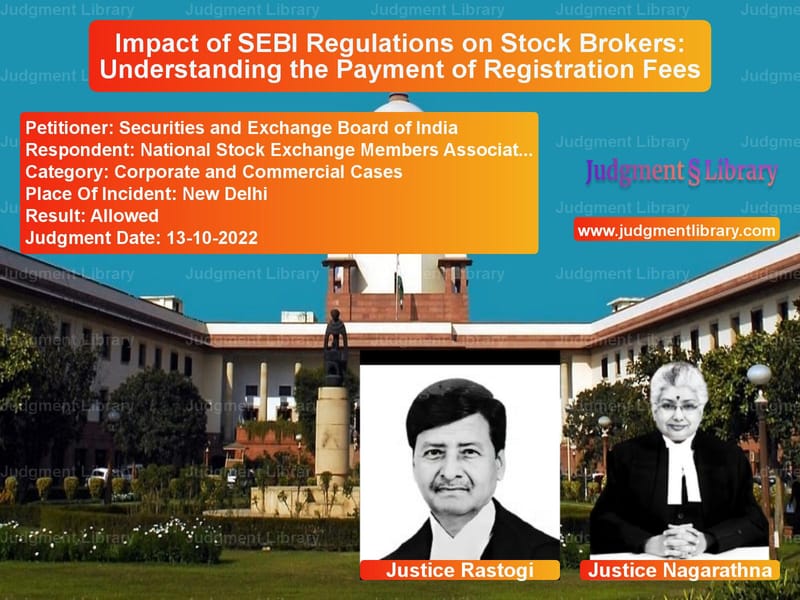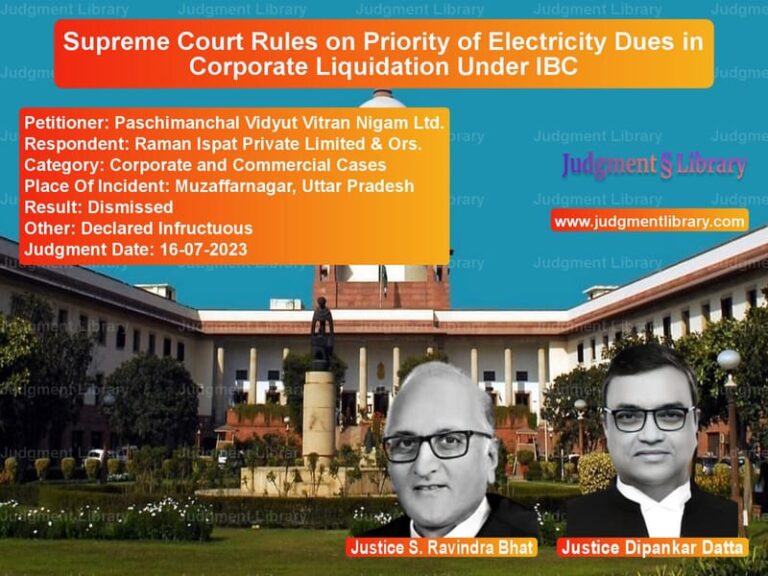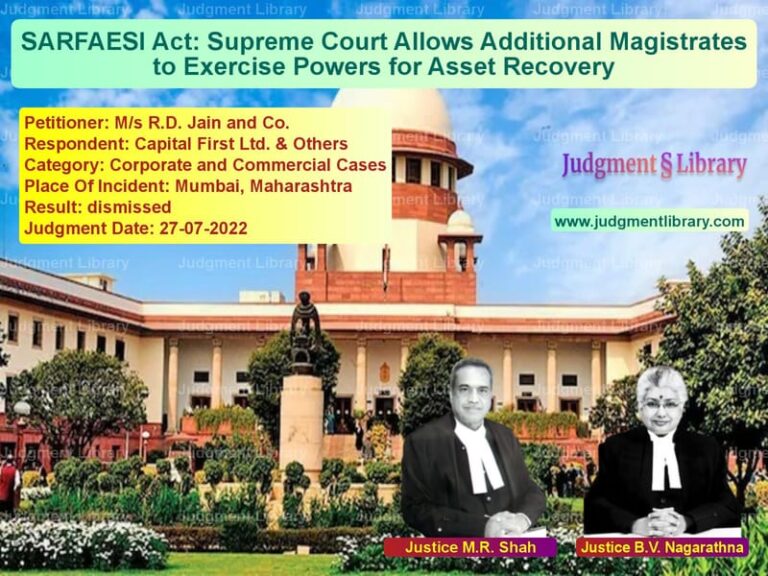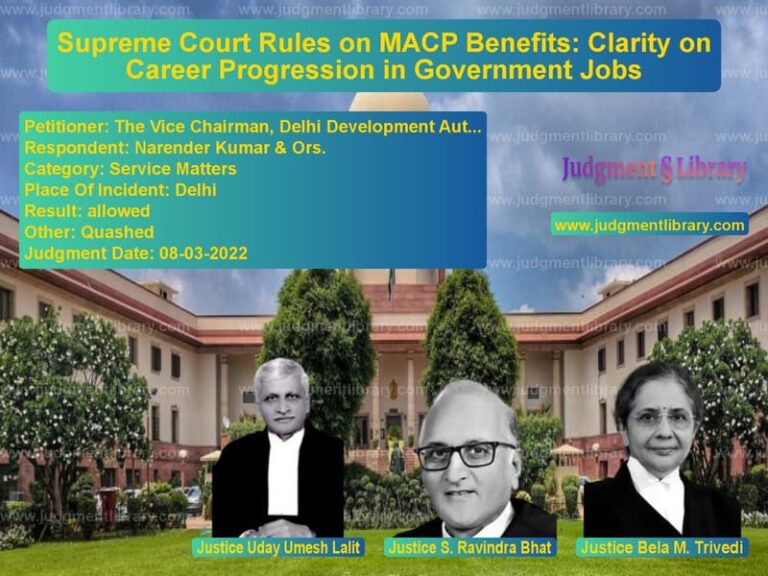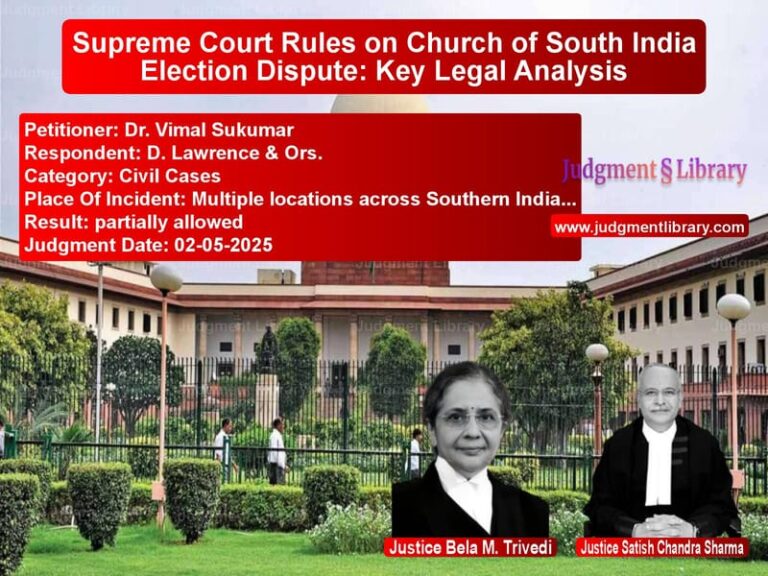Impact of SEBI Regulations on Stock Brokers: Understanding the Payment of Registration Fees
The judgment in the case involving the Securities and Exchange Board of India (SEBI) and the National Stock Exchange Members Association delves into the regulation of stock brokers, particularly focusing on the payment of registration fees as prescribed by SEBI. The case primarily examines whether a stock broker, who is a member of several stock exchanges, is required to pay registration fees for each exchange individually or if a single registration suffices for all stock exchanges.
Factual Background
SEBI was established under the provisions of the Securities and Exchange Board of India Act, 1992 (SEBI Act) with the objective of regulating the securities market, protecting investors’ interests, and promoting the development of securities trading in India. Prior to SEBI’s formation, stock exchanges admitted their members, and brokers could trade in securities according to the rules of each exchange. SEBI’s formation, however, brought about regulatory changes in the securities market, including the registration of stock brokers under its framework.
In the case at hand, the appellants (SEBI) challenged the decision of the Delhi High Court’s Division Bench, which set aside the SEBI circular of 28th March 2002. The circular clarified that stock brokers were required to pay a fee for each registration certificate they held, even if they were registered under multiple stock exchanges. The dispute arose over whether a stock broker was required to pay fees for each of the stock exchanges they were registered with, or if a single registration with SEBI was sufficient.
The Issue at Hand
The key issue revolved around the interpretation of Section 12(1) of the SEBI Act, which mandates that a stock broker must obtain a certificate of registration from SEBI. The question was whether this provision required stock brokers to obtain a separate registration certificate for each stock exchange they were members of, or if a single certificate would suffice for multiple exchanges. The respondents (National Stock Exchange Members Association) argued that a single registration certificate should be sufficient for stock brokers functioning across multiple exchanges.
Appellant’s Arguments
The appellant, SEBI, argued that under the regulations and circulars issued by SEBI, stock brokers were required to pay registration fees for each registration certificate they held, even if they were members of multiple stock exchanges. SEBI pointed out that the regulatory framework, including Regulation 10 of the SEBI (Stock Brokers and Sub-Brokers) Regulations, 1992, made it clear that the fee was to be paid for each certificate of registration. SEBI further emphasized that the fee was regulatory in nature, not a tax, and that it was justified due to the need for SEBI to regulate and supervise the securities market effectively.
SEBI also referred to the fact that multiple registrations were envisioned by the scheme of the regulations, as brokers often required separate memberships for different segments of the stock exchanges, such as equity, debt, and derivatives segments. In this context, it was argued that the Division Bench’s reliance on the phrase ‘a certificate’ was a misinterpretation, as the term ‘certificate’ in the SEBI Act could refer to both singular and plural registrations.
Respondent’s Arguments
The respondents contended that the interpretation of the SEBI Act and regulations should align with the idea of a single registration. They argued that the use of the term ‘a certificate’ under Section 12(1) implied a single registration for a broker, regardless of the number of stock exchanges they were members of. Respondents argued that the imposition of a fee for each registration certificate was inconsistent with the regulatory framework, especially considering that a broker’s turnover should be computed collectively for all their activities, not separately for each registration.
Moreover, the respondents highlighted the lack of provision for multiple registrations in the regulatory framework and suggested that the practice of obtaining multiple registrations was historically a precautionary measure, not a legal requirement. They also argued that imposing fees for each registration was a violation of the principles outlined in the Act, and the Circular issued by SEBI was ultra vires, meaning it exceeded the powers granted to SEBI under the Act.
The Court’s Analysis and Decision
The Court reviewed the provisions of the SEBI Act and the Regulations framed under it, particularly Section 12(1) and Regulation 10. It considered whether the interpretation of ‘a certificate’ as used in Section 12(1) referred to a single registration for all exchanges or required separate registrations for each exchange a stock broker was part of. After analyzing the legal framework, the Court concluded that the regulation requiring a separate certificate for each stock exchange was valid. The Court emphasized that the term ‘certificate’ in the SEBI Act should be understood in the context of the regulatory framework, which envisioned separate registration for different exchanges and activities.
The Court also highlighted the regulatory nature of the fee and rejected the argument that it constituted a tax. It affirmed that SEBI’s Circular, which clarified that stock brokers must pay fees for each certificate they held, was in line with the Act’s objectives and regulations. The Court thus allowed the appeal, setting aside the Division Bench’s decision and holding that SEBI was correct in requiring separate fees for each registration certificate.
Key Legal Points
- The interpretation of Section 12(1) of the SEBI Act does not mandate a single registration for stock brokers operating on multiple exchanges.
- Regulation 10 of the SEBI (Stock Brokers and Sub-Brokers) Regulations, 1992 allows SEBI to impose fees for each registration certificate held by a stock broker.
- The fee is regulatory in nature and not a tax, thus the element of quid pro quo is not necessary for its imposition.
- The term ‘certificate’ in the SEBI Act includes both singular and plural references, and multiple registrations are required for brokers dealing across various stock exchanges and segments.
- The Court applied purposive interpretation, emphasizing the regulatory objectives of the SEBI Act and the need for SEBI to regulate stock brokers effectively across multiple exchanges.
Conclusion
The Court’s decision reinforces SEBI’s authority in regulating the securities market and upholding its role in ensuring that stock brokers adhere to the necessary registration and fee structures. By affirming SEBI’s interpretation of the regulations and the validity of its Circular, the Court provided clarity on the requirements for stock brokers operating across multiple stock exchanges in India.
Petitioner Name: Securities and Exchange Board of India.Respondent Name: National Stock Exchange Members Association.Judgment By: Justice Rastogi, Justice Nagarathna.Place Of Incident: New Delhi.Judgment Date: 13-10-2022.
Don’t miss out on the full details! Download the complete judgment in PDF format below and gain valuable insights instantly!
Download Judgment: securities-and-excha-vs-national-stock-excha-supreme-court-of-india-judgment-dated-13-10-2022.pdf
Directly Download Judgment: Directly download this Judgment
See all petitions in Company Law
See all petitions in Corporate Governance
See all petitions in unfair trade practices
See all petitions in Bankruptcy and Insolvency
See all petitions in Judgment by Ajay Rastogi
See all petitions in Judgment by B.V. Nagarathna
See all petitions in allowed
See all petitions in supreme court of India judgments October 2022
See all petitions in 2022 judgments
See all posts in Corporate and Commercial Cases Category
See all allowed petitions in Corporate and Commercial Cases Category
See all Dismissed petitions in Corporate and Commercial Cases Category
See all partially allowed petitions in Corporate and Commercial Cases Category

